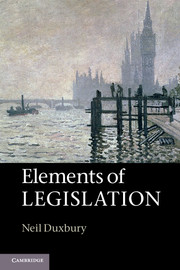2 - The supremacy problem
Published online by Cambridge University Press: 05 December 2012
Summary
Statutory interpretation – a topic to be examined in Part III of this book – only came into its own as a judicial exercise once judges no longer played a dominant role in the preparation of statutes. But it would be a very long time before their role in this process disappeared altogether. Certainly in the first half of the seventeenth century, judges – no doubt because many of them gained experience in drafting statutes before taking office – were still at the service of both commons and lords. ‘In parliament they assisted committees for bills, drafted enactments, explicated points of law and defended them in conferences with the House of Commons.’ Even in the eighteenth century, judges continued to advise the lords on matters pertaining to pending legislation. ‘On the slightest view of the British constitution, we must perceive’, Madison observed in 1788, ‘that the legislative, executive and judiciary departments are by no means totally separate and distinct from each other’, not least because ‘[t]he judges … are so far connected with the legislative department, as often to attend and participate in its deliberations, though not admitted to a legislative vote’. ‘The supreme court of the English people ought to be a great conspicuous tribunal’, Bagehot remarked in 1867, which ‘ought not to be hidden beneath the robes of a legislative assembly’. Yet it was not until the inauguration of the United Kingdom Supreme Court in October 2009 that the appellate top tier was removed from the legislature and that Law Lords (or rather, as they became at that point, justices of the Supreme Court) were actually disqualified from speaking on legislation before the House of Lords and its committees. Before then, the rights of Law Lords to participate in the business of the House of Lords were the same as those of any other life peer, and some twentieth-century Law Lords – sometimes encouraged by lay peers – contributed significantly to legislative debates. The complete separation of judicial and parliamentary functions was a long time coming.
- Type
- Chapter
- Information
- Elements of Legislation , pp. 26 - 54Publisher: Cambridge University PressPrint publication year: 2012



